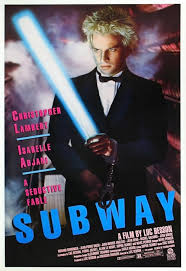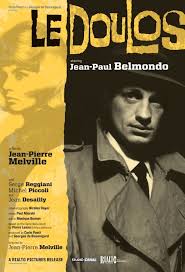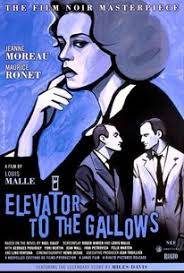Subway (1985) with a runtime of 1h 44m, rated 6.5 by 16,000 cinematizens; Le doulos (1962): 1h 48n, rated 7.7 by 12,000; and Ascenseur pour l’échafaud (1958): 1h 31m rated 7.9 by 29,000.
When prowling around streaming outlets I came across these, one after another, during our Cronulla staycation. I watched them in this order.

Subway has the frenetic energy and mordant wit that director Luc Besson’s films often have. It also has Isabelle Adjani melting the screen. A tuxedoed thief on the run finds refuge in a Paris Metro station (Châtelet?) where he discovers he is not alone. The plot, which makes no sense, is an excuse for the to’ings and fro’ings. This is another characteristic of Besson films. It is all on the surface, but it is fun while it lasts.
Le doulos is Jean-Pierre Melville, the director, out-noiring American film noir. In contrast to Subway this is all serpentine plot. All the threads come together in a downward spiral. Each member of this ensemble is doomed. The moodiness and the movements are compelling in this seedy world of criminals where no one escapes fate.

By some miracle of city planning there is always a parking place in Paris for the Yank Tanks these villains drive. The title is a slang word for an informer, someone who talks, tattles, through or behind his hat.
But the best for last is Ascenseur pour l’échafaud, made when the director, Louis Malle, was a boy of twenty-six. When most that age are making student films of 10 minutes, he directed this feature length masterpiece. Moreover, he did everything against expectations. The elegant, suave, and handsome Maurice Ronet is a reptilian villain, while up and comer Jeanne Moreau is a luminous fallen angel. The close-ups of each of them are unsparing. Sometimes against black backgrounds the characters seem like puppets, and perhaps that is what they are. Compelled by their own instincts, and unable to control themselves, each, in a different way, is driven to a bad end, along with a pair of innocent bystanders, who are not so innocent by the time the film ends.

The tension and drama are all the more remarkable because so much of the screen time is confined to an elevator car.
Moreover, there is a perfect soundtrack from Miles Davis that sets the mood in the middle.
Did Malle read Somerset Maugham’s Of Human Bondage; it would seem so.

